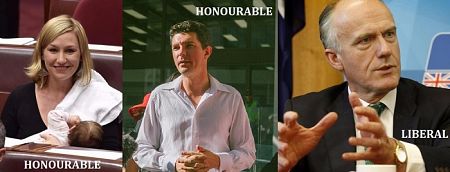Citizenship issues dominated the public debate during 2017 (although Independent Australia had been doing stories on this topic for years). Here, Michael~John Shea focussed on yet another example of Federal Coalition double-standards – this time by Herr Erich Abetz – attracting over 12,000 unique views.
IA'S 9TH MOST POPULAR STORY OF 2017
Eric Abetz vs Scott Ludlam and Larissa Waters: Why the s44 double standard?
Why did Scott Ludlam and Larissa Waters resign from Parliament over holding dual citizenship, but not Eric Abetz? Michael~John Shea reports.

DURING A news conference on 19 July 2017, Tasmanian Senator Eric Abetz advised the Greens’ senators Ludlum and Waters to withdraw their resignations from the Australian Senate.
“Just renounce your citizenship of the foreign country now and remain in your seat,” the Senator suggested.
Because that is exactly what he did.
Truth be told, the news conference part of this story is fiction — but you knew that. Such a thing would never happen in our parliament of double standards.
But the rest is true, because according to reports HERE and HERE, Senator Eric Abetz was ineligible to enter Parliament when he did. Initially, Abetz filled a casual vacancy after a failed election attempt and was then, subsequently, elected as a senator at the following election.
Where is the document Senator Abetz? | Tasmanian Times https://t.co/uYvJrKtM7Z
— Stuart Tomlinson (@virgotweet) July 18, 2017
Legal action regarding Abetz ineligibility was eventually withdrawn — not because the Honourable Senator was in the right, but because the time to lodge objections to the initial appointment and his first election "win" had expired.
The question is, why is it okay for Senator Abetz to be allowed to stay in parliament – or for that matter, Tony Abbott – and not Ludlum and Waters? Is it just because the Greens’ senators are honourable people? People who do the right thing?
Tasmanian antiques dealer John Hawkins, said the election of Senator Abetz in 1994, 1998 and 2004 could only have been challenged in a 40-day window after each election. His election in the 2010 election could not be challenged because by the time Senator Abetz nominated for the 21 August 2010 election he was not a dual citizen.
However, pertaining to the three previous elections, Senator Abetz maintained he had a copy of a 1993 letter he wrote to the German Embassy which proved that he had taken further steps to ensure his German citizenship had been completely relinquished.
At the time the 2010 High Court appeal was withdrawn, Senator Abetz told the Hobart Mercury newspaper that he would provide a carbon copy of the 1993 letter. It was never provided.
From 2010, Hobart Mercury: Abetz challenge ‘withdrawn’ | Tasmanian Times https://t.co/pusTfeUbYh
— Dave Donovan (@davrosz) July 19, 2017
Similarly, ex-PM Tony Abbott was tardy in proving he revoked his British citizenship — a matter which remains contentious.
Adding to the confusion surrounding the resignation of Senators Ludlum and Waters is the stench of archaic meaning in the words of Section 44 of the Australian Constitution that covers these matters.
When the Constitution was drafted, residents of Australia where British citizens. Of course, at that time, Britons predominated — especially given the Indigenous population didn’t formally "exist". The "White" 19th Century residence of Australia held allegiance to the British monarch. New Zealanders and Canadians shared those citizenship characteristics. So it wasn’t Canadians or New Zealanders who were the target of the words of our founding fathers, it was other foreigners — Germans and the like.
Many Australian parliamentarians – almost 30 of the current batch – were born overseas and contention over who else was or is eligible to hold or retain their seat is a matter for further investigation. Perhaps the emphasis of proof should be taken off relying on the word of candidates prior to elections and harsher penalties applied to non-conformers, or perhaps the window of opportunities for public appeal should be widened?
It is true, though, that while the country has lost two highly respected, hard working, intelligent and honest parliamentarians in Ludlum and Waters, there remain others who are deceitful, ignorant and lazy time-servers.
i'm so proud to have spent six good years on the campaign trail with the exceptional @larissawaters. shine on. pic.twitter.com/AAUKXcRAAu
— Scott Ludlam (@Scottludlam) July 18, 2017
Senator Abetz's decision, at the time, to play the bluff and tough it out only serves to make Scott Ludlum and Larissa Waters appear more honourable. But it is time the country sorted out this potential for confusion.
Ludlum and Waters could do this with a challenge in the High Court that could reverse previous rulings on matters related to Section 44, or it would take a change to the Constitution via a referendum.
However, given Australian Federal governments' reluctantance to conduct referenda, that last outcome seems unlikely.
One thing is for sure, though: s44 is likely to claim more victims before this act in Australian politics is played out. Some, like Waters and Ludlam will resign honourably, while some will do everything in their power to save their political skins — and some, like Eric Abetz, may even somehow succeed.
You can read the full and long saga of John Hawkins' efforts to test whether Eric Abetz had truly renounced his German citizenship on the Tasmanian Times through links HERE.
Michael~John Shea is a freelance writer who lives on Queensland's Sunshine Coast.

This work is licensed under a Creative Commons Attribution-NonCommercial-NoDerivs 3.0 Australia License
Monthly Donation
Single Donation
Yes, just a slight aberration, aren`t we silly to think #EricAbetz would do something SUSSSHONKY or even FRAUDULENT https://t.co/ZxIolHnBDr
— Ellie (@elliemail) July 12, 2017
Just the truth. Subscribe to IA for just $5.











